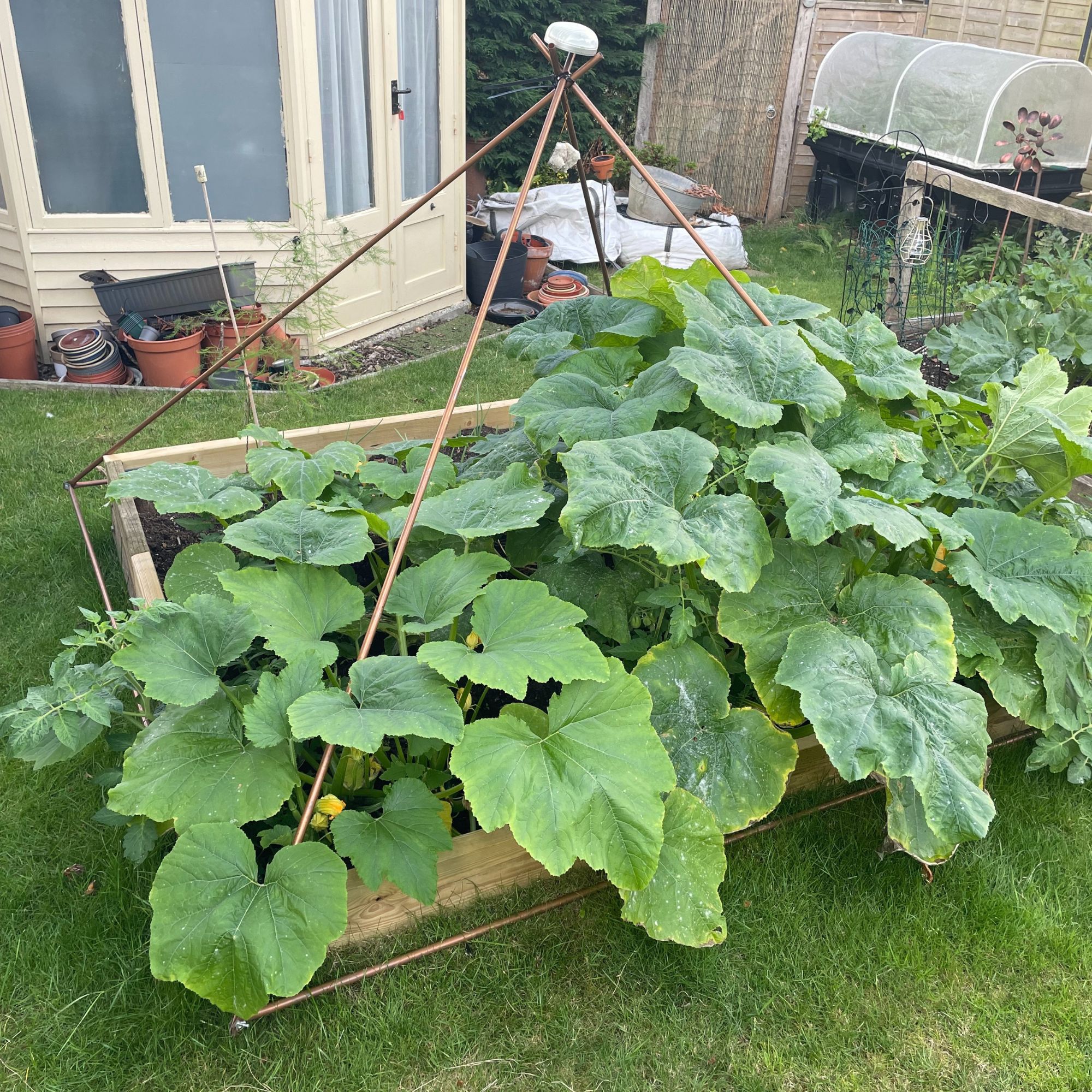
Electroculture gardening and pyramid energy are doing the rounds on TikTok at the moment, and, while they might sound like the sort of terrifying intense garden ideas that require a horticultural degree, nothing could be further from the truth.
In fact, we're going to go out on a limb and say it: they might be among the easiest garden trends we've ever seen. Which, considering they've evolved from ancient gardening methods, is no small thing.
'The concept of electroculture gardening dates back to the early 20th century when researchers began to explore the effects of electricity on plant growth,' says Lina Cowley, senior editor at Trimmed Roots.

'Researchers learned that by exposing plants to low levels of electrical currents, they could significantly enhance their development,' continues Lina.
'This discovery led to the development of various electroculture techniques that aim to improve soil fertility, increase crop yields, and boost overall plant health.'
Intrigued? Us too, so let's dive into the trend together...
Electroculture gardening
Electroculture might have become a very big deal on TikTok of late, but plenty of people have been studying its impact on gardening for years.
'It’s interesting how the awareness of electroculture is growing,' says Shirley O'Donoghue, principal of Lucis College.

'For the last 20 or so years there has been an increasing understanding of energy-based complementary therapies, all of which work with ancient concepts of prana (ayurvedic medicine) or chi (traditional chinese medicine),' continues Shirley.
'Feng shui also works with the flow of this energy within the living or office environment. And it is likewise believed that the earth has its own subtle energy system of meridians and chakras.
'Electroculture is an ancient practice which seeks to harness this energy for the benefit of nature.'
How to start electroculture gardening
While electroculture gardening 'may sound like something out of a sci-fi movie, the idea behind it is based on solid scientific principles,' promises Lina.
To get started, you will need to use a conductive metal antenna, such as copper or galvanised steel wires, to capture negative ions in the atmosphere and drive them into the soil.

'An easy first step is to the get a wooden or bamboo stick and wind copper wire around the stick,' says Shirley simply.
'Any height will do, but you should wrap the wire around the stick in a spiral upwards towards the sky facing Magnetic North – which you can find using a compass on your phone.'
Doing this is said to enhance the earth’s natural magnetism, which will benefit your plants.
The benefits of electroculture gardening
The purported benefits of electroculture gardening are simple enough: healthier plants, greater yields, tastier edimentals, and happier gardens all round.
1. Better absorption of nutrients
One of the most significant advantages of electroculture gardening is improved nutrient absorption.
'Electrical currents stimulate the roots of plants, making them more receptive to absorbing essential nutrients from the soil,' explains Lina.
'This means that your plants will be able to take up nutrients more efficiently, resulting in healthier and more robust growth.'

2. Better resistance against pests and diseases
Another benefit of electroculture gardening is increased pest and disease resistance.
'Electrical currents have been shown to strengthen the cell walls of plants, making them less susceptible to attacks from pests and diseases,' says Lina.
'This means that you can reduce your reliance on harmful chemical pesticides, making your garden more eco-friendly and safe for beneficial insects.
3. Better water retention
If rain harvesting is very much your jam at the moment, you'll be pleased to learn that electroculture gardening can also improve the water retention capabilities of the soil.
'By stimulating the roots, electrical currents encourage the development of a more extensive and robust root system,' says Lina.
'This, in turn, enhances the soil's ability to retain moisture, reducing the need for frequent watering and helping your plants thrive even in dry conditions.'
Pyramid energy gardening
Of course, if you want to take electroculture gardening to a whole other level, you can combine it with pyramid energy gardening – which, inspired by the beliefs of the Ancient Egyptians, Greeks, and Mayans around the mystical powers of pyramids, suggests that pyramids can harness and amplify energy, creating a beneficial environment for our plants.
'While the scientific community is still divided on the exact mechanisms behind pyramid energy, there are countless anecdotal reports of its positive effects on plant growth,' says Lina.
'Many gardeners claim that by placing their plants inside or near pyramids, they have witnessed accelerated growth, increased yields, and improved overall vitality.'

Shirley, who has combined electroculture gardening with pyramid energy by fashioning a copper pyramid structure (seen above), says: 'I’m amazed at the effect it has had on my courgette and tomato plants after just a few weeks without the addition of fertilisers or manure.
'They much healthier and more abundant than the plants I placed in an adjacent bed without the addition of the copper pyramid.'
So, how does it work? Well, some theories suggest that 'the shape and geometry of the pyramid structure create a unique energy field that enhances the plant's natural electromagnetic field, leading to improved growth and vitality,' says Lina.
Curiouser and curiouser, eh? Never have we ever wanted to try a garden trend more...
Does electroculture work for plants?
People have been citing the benefits of electroculture gardening for decades now, with scientists in the 1900s conducting experiments which led to unusually large carrots and potatoes. A recent study in 2022, too, has revealed that a crop of peas subjected to electroculture gardening conditions resulted in a larger yield and faster growing veg, too.
What materials are used in electroculture?
Electroculture is a very easy (and cost-effective) to garden, as all you need is... well, is nature. Think the warmth of the sun, the hydrating properties of the rain, the nitrogen in the air, and an atmospheric antenna crafted from copper or brass.







